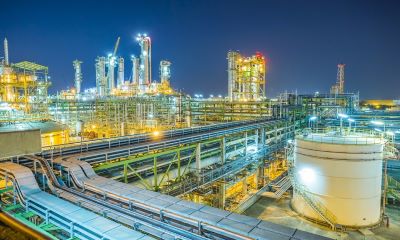When the industry is aiming for double digit growth, the role of supply chain partners becomes even more crucial

For the supply chain partners of the chemical industry, the global pandemic has made their job ever tougher. With delayed supplies becoming a regular affair, experts suggest chemical companies to rapidly adopt innovative technologies. They point out the need for speed and agility as the keys to staying resilient and competitive.
“There have always been challenges associated with logistics but in the past two years since the pandemic we have witnessed the distractions at a different level. The poor infrastructure, inventory issues and booking concerns were few of them. The cost was at its peak and service was at lowest. We were paying 80% to 90% of the cost and we were getting the worst service in decades. There were articles that mentioned how the shipping line reliability ratio dropped to 34% and cost increased to 80 to 90%. Despite such poor service we had no option but to pay. The biggest challenge is unpredictability as we don’t know what the cost is when we take up a new order. We can’t predict the cost for next year and even shipping lines tell us that the cost won’t come down before the year 2023,” said Seema Kapur, Director-Logistics, Jubilant Ingrevia.
Kapur shared her insights along with other stakeholders at the NextGen Chemicals & Petrochemicals Summit 2022 organized by the Indian Chemical News on July 21-22, 2022. The session titled ‘Securing supply chain for the chemical industry’ was moderated by Captain Ram Iyer, India Representative, Haropa Port.
Highlighting a few critical issues, Kapur added further: “Awareness is lacking especially at the drivers level who aren’t even aware what chemicals they are carrying. For loading the containers into vessels, we have to seek umpteen number of approvals for more than 24-48 hours but sending it on the road doesn’t need any. Because of poor infrastructure we have cases of leaking from containers but we don’t have any professional agencies to take care of it. In the same way when our containers are at the ports in the US or Europe, the same procedure would require so many formalities to be completed. Here in India these tankers are treated like normal.”
“As a port we do three major activities. One is cargo handling and the challenges we encountered post Covid was unpredictability. The second activity is value added logistics where apart from cargo handling we provide services such as repackaging of products for the companies. Due to lack of predictability and shortage of containers, our warehouses were struggling. Companies were trying to maintain their timeline and pipelines were huge. There was also a complete shutdown of truckers a few times and unavailability of timely road services. The third aspect of our port is industry. The companies such as BASF rely on raw materials that come from across different parts of the world. Adhering to sustainability norms is also a big challenge before the industry,” said Daljit Singh, India Representative, Port of Antwerp-Bruges.
“Last two years were challenging for all the industries including chemicals. Specific to the chemical industry, earlier we had an ideal scenario as we were getting the orders, and working with the shipping companies. One call and most of the concerns used to get resolved but now in this scenario the things are becoming very challenging. Reliability is almost at the negligible level, If you talk to the shipping company, they will reveal different stories and try to charge you two to three times the cost than normal. That’s the challenge,” said Dr Ghanshyam Singh, Head-Purchase & Supply Chain Management, Cosmo Film.
“We are a company that is selling the product to the customer and paying shipping costs. So if we are taking the orders two months in advance and every week shipping charges are changing, we are in a dilemma about the price to be quoted to customers. Since most of the chemicals go to the B2B clients and they are dependent on us, the reliability is at stake due to a delay of two or more months. That is affecting the overall supply chain. The multiple lock downs during the pandemic hampered supply chain and reliability became a causality. Now we are hopeful that market dynamics will change and things will improve,” added Singh.
“Both industry and research institutes are dependent on chemicals for research and whenever they place an order it takes 2-3 months. We have to rigorously follow up with the supply chain partner. This raises the questions as to why hasn’t the industry like any other industry not been able to adopt new technologies to accelerate the supply. There are three kinds of supply chains. One is country to country supply where the sea and air route play a major role. Second is cross border and third is domestic which has become too complex due to lack of awareness. As an entrepreneur who is digitizing the supply of chemicals, I can say it is really difficult. Till now there is no dedicated logistics company for the chemical industry. That means if you have to transport chemicals from Vadodara to Hyderabad or Hyderabad,” said Dr Rafi Shaik, Founder & Chief Scientific Officer, Carbanio.
“There is a lot of turbulence in terms of economic growth globally and supply chain issues are persisting. Despite that, there are exciting times ahead for the chemical industry. And when the industry is aiming for double digit growth, the role of supply chain partners becomes even more crucial. It is not just about the typical logistics requirements but being able to meet the upgraded needs of the industry. Partners must support it and ensure that there are effective, reliable and resilient supply chain solutions while also maintaining the safety and compliance,” said Captain Iyer.
Subscribe to our newsletter & stay updated.